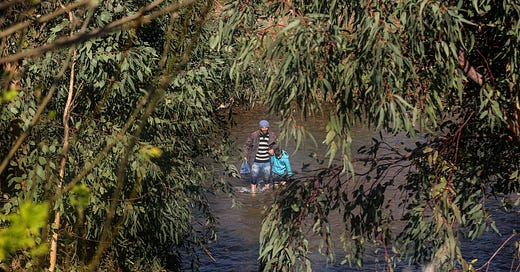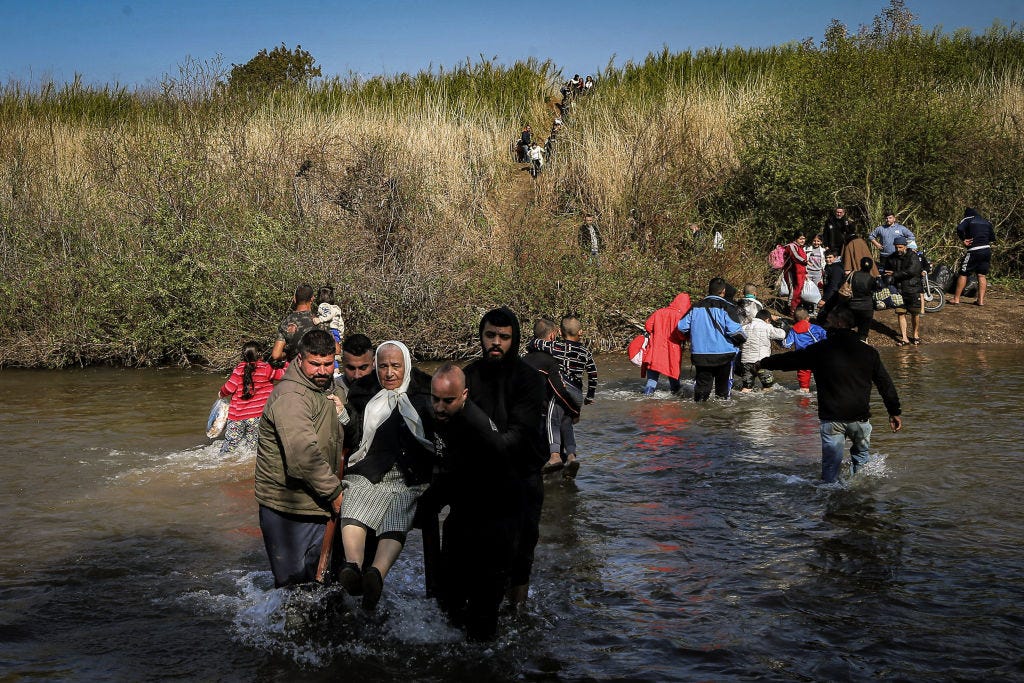
The Free Press

My friend Ali, who lives in the coastal mountains of Syria, is currently confronting a version of the dilemma Jews in Eastern Europe would have confronted in the spring of 1939, as the German tanks rolled into Prague.
It is clear he and the some three million Alawites who live in those mountains are in mortal danger because of the Islamist terrorists who now rule Syria. That the threat is worsening by the day. But his family—Alawites who have lived there for centuries, long before the Assad family assumed power—know no other home.
Should he run?
Ali’s elderly mother is sick, and his two adult sisters have nowhere to go, nor do they have the money to get there. At the moment, travel to Beirut, the closest safe place, costs $180 in taxi and bus trips. And Ali does not know where he’ll stay or how he’ll support himself if he does manage to scrape the money together.
Ali and I could come up with $180, but what about the untold costs of life in Beirut without proper working papers? And isn’t it possible that the dangers of movement will turn out to be greater than those of staying put? The new government in Syria has established a fluctuating system of checkpoints on the highways outside of Ali’s city, Safita. Nobody knows what law governs the men who control those checkpoints. If Ali were to turn up at the first one, the men there might well prove to be in a good mood. But what about the state of mind of the men at the next one? And the one after that?
Ali and his family would have much less to worry about if the armed pro-government forces that have been bearing down on the coastal mountains of Syria were merely concerned with bringing those who committed crimes under the reign of Bashar al-Assad to justice, or putting down the militias that are challenging the new regime. This is what the nation’s current president, Ahmed al-Sharaa (otherwise known as Abu Mohammad al-Jolani), has suggested. But this isn’t the danger the inhabitants of the coastal mountains now face—nor does anyone there really believe that the killing will stop once the old apparatchiks and the new militiamen are brought to heel.
About the actual danger, there can be no doubt. That is because Ahmed al-Sharaa and his supporters almost always film what they do, then upload their barbarism to social media. We’ve seen sons massacred in front of their mothers. Soon to be executed young men have been made to crawl through the streets and bark like dogs.
There have been videos of mass arrests, of corpses submerged in vats. In one video, a zealot is pictured inside a truck at the scene of a massacre as he broadcasts instructions to his colleagues: “To the mujahideen and those who stand guard, do not leave alive any Alawite, male or female. The most respected among them will be slaughtered. The most respected Alawite woman will be slaughtered. Slaughter them all, including the children in the bed. These are pigs. Take them and throw them into the sea, as the sages of old advise.”
I don’t need to see those horrific videos to know their evil. I know because I lived it.
From 2012 to 2014, I lived among the men who now control Syria, the men of Jabhat al-Nusra, the precursor to Hayat Tahrir al-Sham. As the bombs fell, the fighters prayed, argued, and plotted. I listened to them dream and plan for the death of their enemies, in particular the Alawites. So I know that asking Ahmed al-Sharaa to protect the religious minorities in Syria is like asking a fox not to eat a field full of chickens.
I bumbled across these powers during the course of an ill-fated reporting trip in Aleppo in October 2012. I had gone there to report on the songs and poetry the revolution was churning up, when a group of young men who introduced themselves as freelance reporters took me prisoner. My captors blindfolded me right away, then tossed me into a makeshift grave. They hurled bucketloads of dirt onto me, kept me there for a few hours, and when evening arrived, they hung my body from a trellis that had been rigged up over a cement irrigation pool. I didn’t expect to survive the night.
Looking back, I suspect there was a purpose behind all of this. They wanted me to feel that I had been set upon by an unearthly power—one that had always dwelled out there in the wind and in the rolling fields to the north of Aleppo that I had remained ignorant of. Somehow, my captors engendered this state of mind in me without saying a word, without trying at all, and without my being able to see them. In this respect, it really was like an encounter with a supernatural power, unknown to science, but undeniable to anyone in its grips.
After a week of torment—made to sit silently in the corner of a room for days on end and suffer electricity, whips, and cudgels as punishment for any movement—these men brought me to the basement of the Aleppo eye hospital. At the time, the eye hospital functioned as a dormitory for foreign fighters from places like France and Turkey, a staging ground for attacks against the regime, and a kind of central repository in which the commanders who would go on to lead ISIS (among them: Mohammad al-Adnani, the author of the November 2015 attacks in Paris) and those who would go on to lead Syria (among them: Ahmed al-Sharaa, then chief of Syria’s al-Qaeda faction, Jabhat al-Nusra) housed their prisoners.
Down in this basement, the kind of talk for which the Syrian government had once disappeared its citizens from the streets echoed through the air as often as the call to prayer did. O you Alawite policemen, O be patient, Alawites of all kinds, for we are coming to slaughter you—so began one of the war hymns I memorized within my first week in prison.
In this basement, it was taken for granted that the Alawites were the true source of Syria’s oldest, most vexing problems. Perhaps they were secret Jews, as I heard on several occasions. Perhaps they belonged to a race of conjurers. They had filtered in from Iran through the centuries, and so, properly speaking, were to be referred to as “Magoos” or Magi. One thing they were not was Muslim. Rumor had it that instead of bowing to the Kaaba, they bowed down before the open legs of their wives, and that the only reason an Alawite went to a mosque was to cast spells over the good people of Syria as they prostrated themselves to God. All of this I learned within my first days of imprisonment.
At the time, the nation’s chief Alawite, Bashar al-Assad, controlled an air force and fleets of tanks. If anyone was to be slaughtered en masse, it would be my captors, the men of Jabhat al-Nusra, and their brethren in ISIS, the nascent terrorist group. I hoped for this, but doubted that the Syrian Arab Army was capable of doing away with any of the rebel groups.
And I was too terrified for myself to care.
I regularly expected to be killed. On one such occasion, six months into my imprisonment, a pair of teenage guards entered my cell. I could see that in the corridor at their backs, about two dozen prisoners, each handcuffed and blindfolded with strips of pale blue cloth, were trudging toward a stairwell. Within a matter of seconds, I was blindfolded, my hands zip-tied behind my back.
I recall being tossed into the back of a pickup truck and being sat upon by my two cellmates, who were thrown in on top of me. “No movements from any of you,” said a voice. “Not a word. Or we put a bullet through your brains. Understand?” We pulled into the courtyard of a stately villa. The soldiers who greeted us there—men we had never seen before—were in full battle dress. They waved their Kalashnikovs in the air like a team of wild hockey players and jerked us onto the pavement. We were swine, filth, rats. The Jabhat al-Nusra men heaved their cable whips into the prisoners’ flesh. “Get up, boy!” they screamed. “Alawite animal!”
We were eventually led into an unlit basement room about the size of a shipping container. A phalanx of gunmen pushed us across the threshold. Their large bellies, the many bandoliers slung over their shoulders, their gray beards, and their piercing eyes told us that we were now dealing with the upper echelons of Jabhat al-Nusra power.
We hurried to the wall at the back of this cell, got on our knees, and pressed our faces against the wall or into the backs of those who knelt in front of us. As I knelt, I could feel that somewhere behind me, additional truckloads of prisoners were being flung onto the floor. Probably about 25 men, all told, knelt beside me.
In that moment, I imagined a heap of bloody bodies and recalled, bizarrely, that Czar Nicholas II and his family had been executed in a basement, that the event had gone off poorly because the jewelry the Grand Duchesses had sewn into their dresses deflected some of the bullets, and that afterward, the revolutionaries threw their victims down a mineshaft. And then, as on so many similar occasions, nothing happened. The gunmen backed away. Someone slammed a door at our backs.
Now that I’ve had 10 years to think about things, I consider the kneeling, the silence, and the terror through which our captors put us that afternoon to have been an odd kind of participatory theater. During my two years among the terrorists, I suspect I played my part in a hundred such exhibitions. Why? Perhaps because back then, Jabhat al-Nusra was in no position to actually triumph over the temporal powers of the world; they wanted to enact a scene in which such a victory was a palpable fact, as true as our zip ties and the butts of the guns they shoved into our backs.
But now their dark fantasy has become reality. Now, the entire nation of Syria lies at their feet. And the Alawites have no protectors and no place to flee.
My friend Ali no longer leaves his home, nor do his male neighbors. Because I cannot think of any other way to make myself useful, I’ve set up this Indiegogo campaign for him. Here’s hoping that it will make a small difference for one innocent human being now at the mercy of Hayat Tahrir al Sham.
If you missed it, watch Theo Padnos’s interview on Honestly: “They Tortured Him for Years. Now They Rule Syria.”




